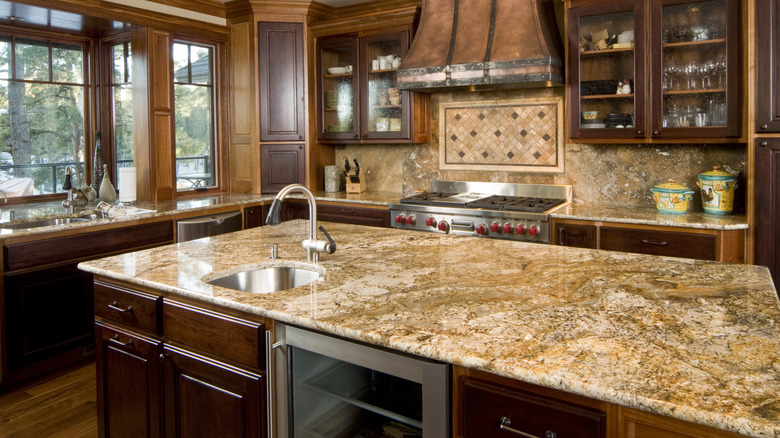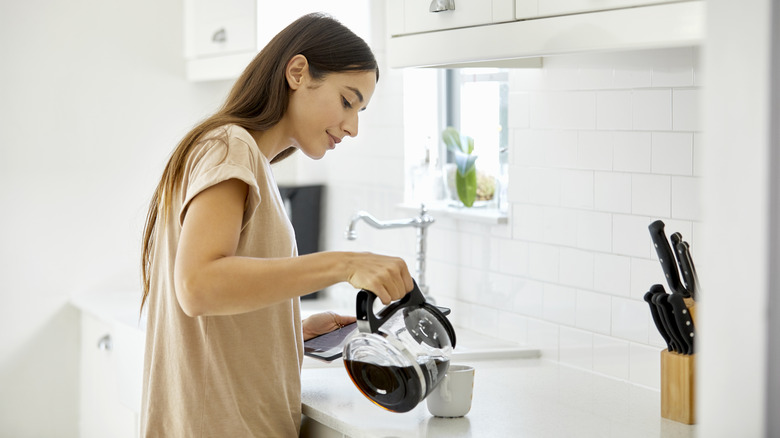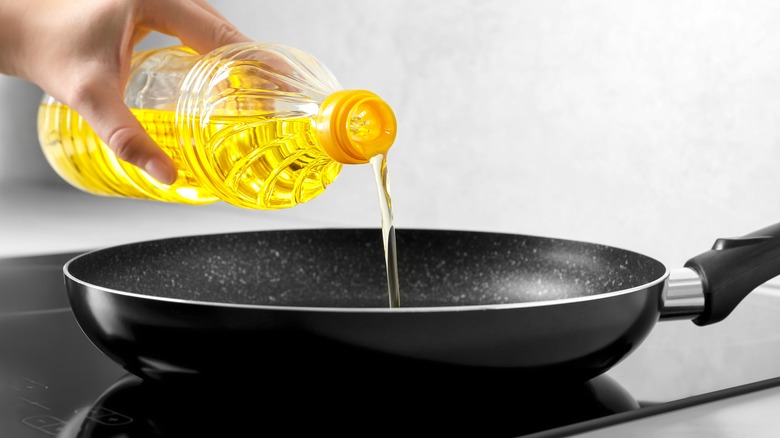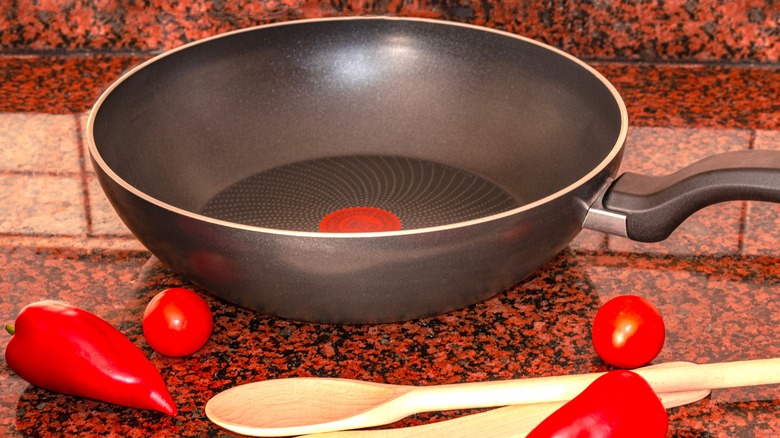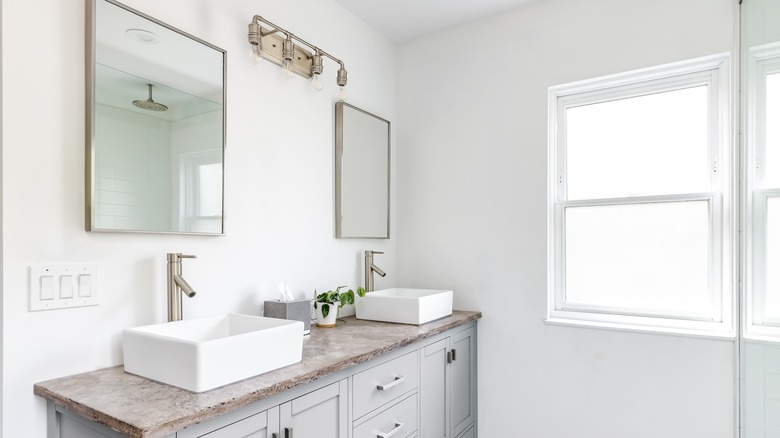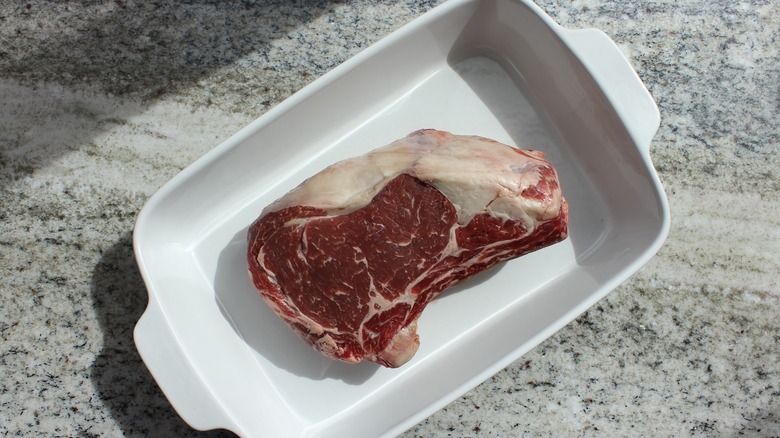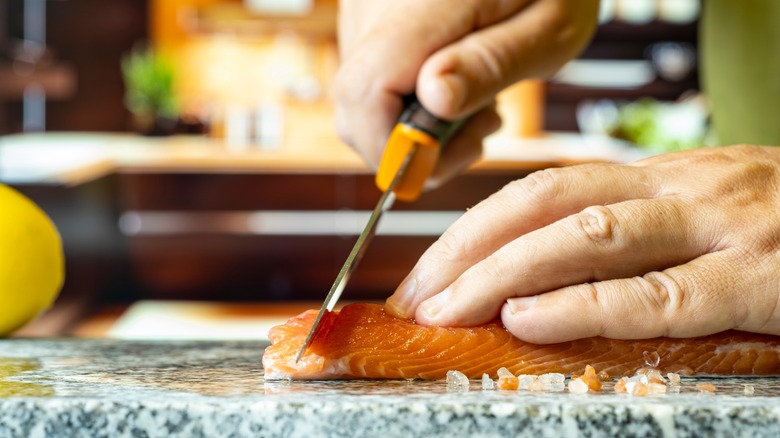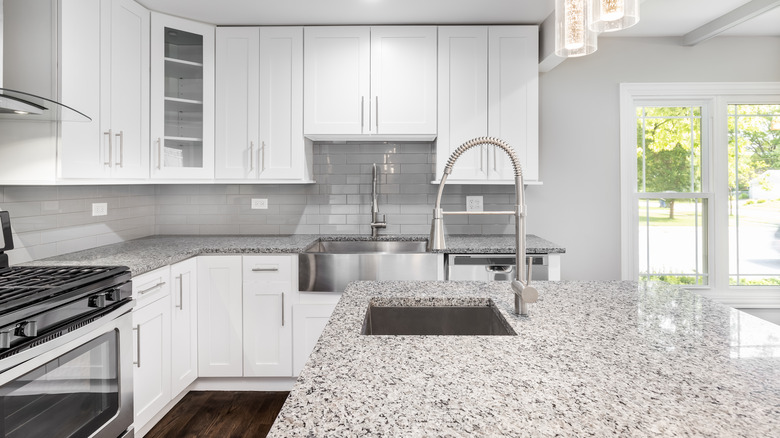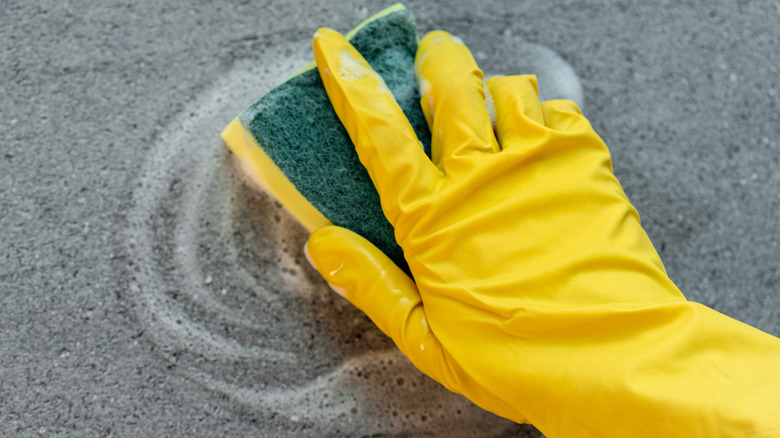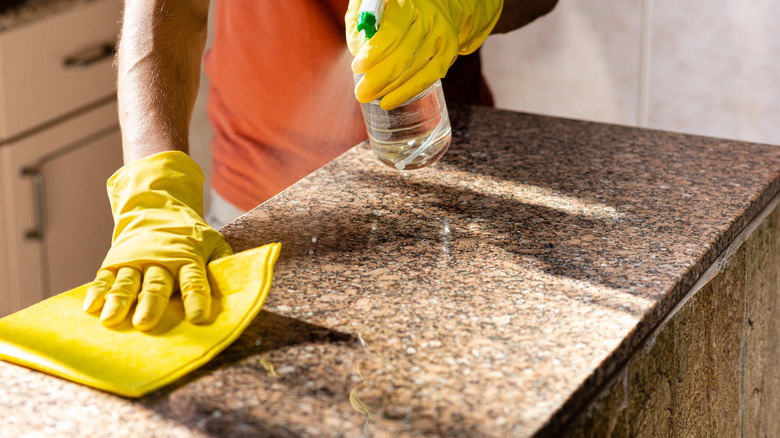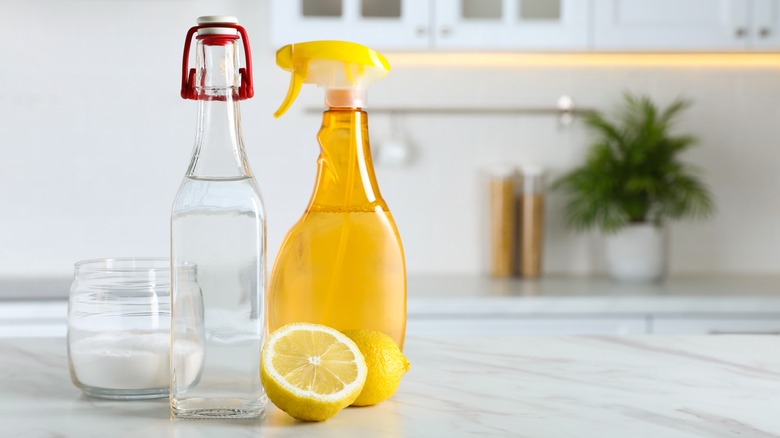11 Things You Should Never Do If You Have Granite Countertops
Granite is one of the most popular countertop materials seen in kitchens and bathrooms — and for good reason. Not only are they considered more sustainable and durable than other materials, but they also suit homeowners looking for more earth tone-colored countertops. As granite is a natural rock, you can likely find countertops colors in white, black, brown, and multi-colored shades to suit your preferences. While granite is also costlier than some other countertop materials, it adds both an aesthetic appeal and increased value to your home, two aspects any homeowner can appreciate. According to Forbes, granite countertops were first available 100 years ago to more wealthy homeowners, but have since become more accessible and popular than ever.
Still, despite all the pros of granite counters, they also require a lot of care and maintenance to prevent stains, cracks, and scratches. There are several ways you can help prevent such damages to your granite countertop investment, but you may still consider reaching out to a professional if you have visible cracks and fissures. What's also just as important are things you should not do with granite countertops, which we'll cover below.
Don't wait to clean up spills
Granite rock is quite porous. Considering these countertops occupy functional spaces where a lot of living takes place, spills and accidents will happen, whether it's a knocked over cup of coffee or splattered oil from stove top cooking. While seemingly harmless, failing to clean up spills on granite can ruin the seal protecting the countertop, and possibly stain it, no matter what color granite countertop you have. This is especially the case if the spill is left to sit for several hours, or even overnight.
From an aesthetic consideration, spills can also leave permanent spots on your granite. Some of the worst offenders, according to Flintstone Marble and Granite, include red-colored and acidic liquids, such as cranberry juice and red wine. However, even lighter-colored liquids can eventually weaken the countertop's sealant and cause stains.
Taking a few extra minutes to clean up spills can make a big difference in both the longevity and aesthetic appeal of your granite. Simply use hot water with a mild soap, or a designated granite cleaner to promptly clean up minor spills. If you're in the middle of cooking and can't stop to thoroughly clean up a spill, you can still quickly blot up the liquid with a paper towel until you have more time to clean your granite countertop. Just be sure to do so as soon as you can.
Don't use your granite countertop as a step stool
While granite is technically a rock, your countertop may not be so "rock solid." Therefore, it's not advisable that you treat your granite countertop as a step stool. Kneeling, standing, or sitting on granite can cause the countertop to crack. This applies to situations such as trying to reach an item in a high cabinet. More importantly, this is not a safe practice for adults and children alike, as the countertop could potentially give way and cause falls. Plus, if you regularly shine your granite countertops, the surfaces may be slippery, making falls even more likely. Aside from standing on granite causing potential cracks, placing too many heavy items can do the same.
If you're tempted to stand or kneel on your granite countertop, even for a brief moment, take a step back and grab either a ladder or step stool instead. Make sure that children don't climb the countertops or sit on top of them. You can help preserve both your countertop and your physical safety by taking a few extra minutes to do so. Additionally, avoid placing heavy items on top of your granite countertops, including large boxes, tools, or multiple kitchen appliances in the same area. You'll also want to take extra care when lifting heavy objects from on top of your granite, so that you do not accidentally drop them and chip the surface.
Don't use cooking oil directly on your granite countertops
Unfortunately, cooking oils can stain and damage granite. These include vegetable, canola, olive, and avocado oils. They can splash out when cooking on stovetops, and the liquids may run down the sides of your bottles when they're left directly on your countertop as well. If you're using oils, consider placing paper towels or coasters underneath the bottles, should any of them spill or leak during use. When cooking with oil on your stove top, you can help prevent splashes onto the surrounding granite by using oil covers on top of your pots and pans.
Above all else, know that spills are likely when you're dealing with food, so be prepared to clean up spills immediately. If you see that cooking oil has stained your granite, despite cleaning the area, you can try making a paste out of equal parts cornstarch and water. Apply the paste directly to the stain and leave it on overnight. The idea here is that the cornstarch can help absorb the oil, but if the stain remains after rinsing the area off the next day, you may need to seek professional granite stain removal services.
Don't place hot items on your granite countertops
Technically, granite is a heat-resistant rock, which may not get damaged directly from a hot pan or pot, or another heated item. In fact, this is one of the reasons why granite is marketed as a durable surface. However, while it may seem harmless to transfer a pot from the stove or a pan from the oven directly to your granite countertop, this can actually weaken the sealant. The granite itself can withstand heat, but it may be prone to cracks and stains later down the line if the sealant is frequently damaged by the placement of hot cookware. The same goes for placing hot flat irons or curling irons on top of granite countertops in bathrooms.
It may be tempting to put a hot pan or pot on your countertop for just a second, but repeated offenses can damage the granite sealant over time. Instead, do your granite countertop a favor and make sure you have plenty of potholders on standby whenever you're cooking. These create barriers between the hot items and your granite so that the sealant stays protected. Trivets can also help protect your granite against long-use appliances in your kitchen, such as crockpots, as well as hair styling appliances in your bathroom.
Don't place toiletries on top of granite in bathrooms
If you have granite countertops in your bathroom, consider keeping toiletries like shampoos and facial cleansers either underneath the sink or in a separate container on top of the counter. Acidic products, such as nail polish and nail polish remover, should never be used on top of granite. Consider using these over paper towels to help protect your countertops. Also, while cleaning your bathroom, it's best to avoid using general bathroom cleaners on granite countertops in these spaces. Many bathroom cleaning products contain bleach, ammonia, or abrasives, all of which are not safe to use on granite.
Instead, use soft cloths, warm water, and soap for general countertop cleaning, and granite-specific cleaners once a week to help keep your countertops shiny. You may also wish to polish your granite once a month, including the surfaces, as well as the sides and corners. Aside from proper cleaning and polishing, make sure you keep toiletries from directly touching granite. If spills occur, clean them from you bathroom granite in the same way as you would wipe up a kitchen countertop spill.
Don't handle raw meat on granite countertops
If your kitchen granite countertop is clean, you may be tempted to handle raw meat and not bother with plates, cutting boards, or paper towels. However, you should never place raw meat on a commonly-touched surface like a countertop, and especially granite. Bacteria, such as salmonella, can stick in the crevices of granite. This includes small damaged areas in the sealant you might not be aware of. Bacteria from raw meat can then grow and pose a health risk to you and other members of your household if they touch the contaminated area.
While it's preferable to handle raw meat on clean cutting boards, you'll still need to make sure you properly clean your granite countertop afterward. Before you reach for a disinfectant, know that such products may indeed kill bacteria like salmonella, but these can also damage granite by discoloring it. Use hot water and a mild soap instead.
Don't cut food with knives directly on your countertop
Due to the durability of granite, you might be tempted to save dishes and skip out on using cutting boards, thereby cutting foods directly on your countertop. Even if your countertop is clean, you should never cut food with knives on granite. This can damage the sealant, and even your knives too, making them dull and thus unsafe overtime. According to Flemington Granite, the use of knives directly on granite dates back to the early 2000s, when a myth circulated that said it could replace a cutting board. As granite countertops began getting damaged with this practice, though, the myth was proven false. Also, if the countertop's sealant has already worn down, chopping food with knives can leave your granite with permanent cuts and chips. Aside from potential damage to your countertop, this can also be dangerous to your health due to bacteria entering the crevices in damaged sealant.
As with raw meat, always use clean cutting boards when cutting food. Also be sure that you're using sharp knives to help reduce accidental cuts to yourself, a common danger with dull knives. Another important way to prevent damage to granite countertops is to never place an unused knife on top of them, as you might inadvertently scratch their surfaces. Instead, when a knife is not being used, leave it in a knife block, protective cover, or on top of a plate or cutting board.
Don't assume an older granite countertop is sealed
When a granite countertop is installed, it must be sealed to protect the rock from stains, cracks, and other types of damage. Over time, however, the sealant can break down, especially if it was not properly cared for. This is why it's important not to assume a granite countertop has its seal intact, particularly if you're buying a home where granite countertops were previously installed. You won't know offhand whether the granite was properly cleaned and maintained by the previous owner by sight alone.
However, there is a way you can test to see whether your granite countertop is sealed properly. You can place a few drops of water on the countertop to see if it soaks through, according to Huntsville Granite & Marble. If the drops of water bead up on the surface, this indicates the sealant is still intact. On the other hand, if the water disappears and soaks into the granite after a few minutes, then this means the sealant is damaged.
In terms of how often you should seal granite, there's conflicting information. While Westside Tile and Stone notes that some people reseal their granite countertops every 1 to 3 years, this might not be necessary if the countertops are well cared for. The key is to instead conduct the above test. If there are signs that your granite countertop is starting to absorb water, talk with a professional or invest in a water-based sealant you can apply yourself.
Don't scrub your granite countertop with abrasive sponges or cleaners
When cleaning up spills or sanitizing your countertops, it's important to avoid using anything that "scrubs" surfaces when you're dealing with granite. This includes abrasive sponges or cloths, brushes with bristles or wires, as well as cleaning wipes that have built-in scrubbing features. These can damage the sealant protecting your granite, eventually causing problems with your countertops.
Instead, you can clean your granite countertops with a soft washcloth, microfiber cloth, or paper towel instead. If food or spills were mistakenly allowed to cake on top of the countertop, you may need to make multiple passes with your soft cloth, soap, and warm water. Avoid the urge to use abrasive scrubbers, as these will do more harm than good. While white granite is the most prone to countertop stains, black granite may also be susceptible due to its density. If you're dealing with a true stain, call a granite and stone professional for help.
Don't use disinfectants to clean your granite countertops
It's important to get rid of germs in your home, especially those that may lurk on common surfaces, such as door handles, light switches, and countertops. In recent years, the use of disinfecting wipes and sprays has also increased, making fighting germs perhaps easier than ever. When it comes to granite countertops, however, you should not use disinfectants to clean your countertops. While disinfectants may not damage granite per se, these can leave your countertops with streaks and an unwanted murky appearance. Also, if you sanitize your countertops each day with mild soap, a cloth, and water, you shouldn't need to use a disinfectant at all.
Soap, hot water, and gentle scrubbing is generally enough to get rid of germs. However, if you need a stronger disinfectant due to contamination from raw foods, or if someone in your household is sick, you may consider making a gentle disinfecting solution without resorting to products that have harsh ingredients. In such cases, Huntsville Granite & Marble recommends creating a 1:1 solution of rubbing alcohol and water in a spray bottle and allowing the product to sit on your countertop for up to five minutes before wiping it off with a gentle cloth and water. This can also be a good way to get rid of possible murky-looking soap accumulation that's left on your granite countertop from not using enough water during regular cleanings.
Don't use vinegar to clean your granite countertops
Just as you want to try and avoid spilling coffee, orange juice, and cooking vinegar on your countertops to protect your granite, you'll also want to double check that your countertop cleaners don't contain anything acidic, either. One of the worst offenders is a DIY vinegar cleaning solution, which is something you should never use on granite countertops. You should also avoid other harsh cleaners, such as bleach and ammonia. As a rule of thumb, steer clear of anything acidic to clean granite countertops. Aside from vinegar and bleach, this also includes any commercial or DIY product with lemon or orange.
Instead, warm, soapy water is a mainstay for cleaning spills and debris from granite countertops. You can also use a soft sponge without abrasive scrubbing pads, a microfiber cloth, or soft paper towels. Another option is to use a granite countertop cleaner, which you can find at grocery stores and home supply shops. While these cleaners are certainly more expensive when compared to vinegar, a little bit more money in the short-term goes a long way in protecting your countertop investment in the long-term.
